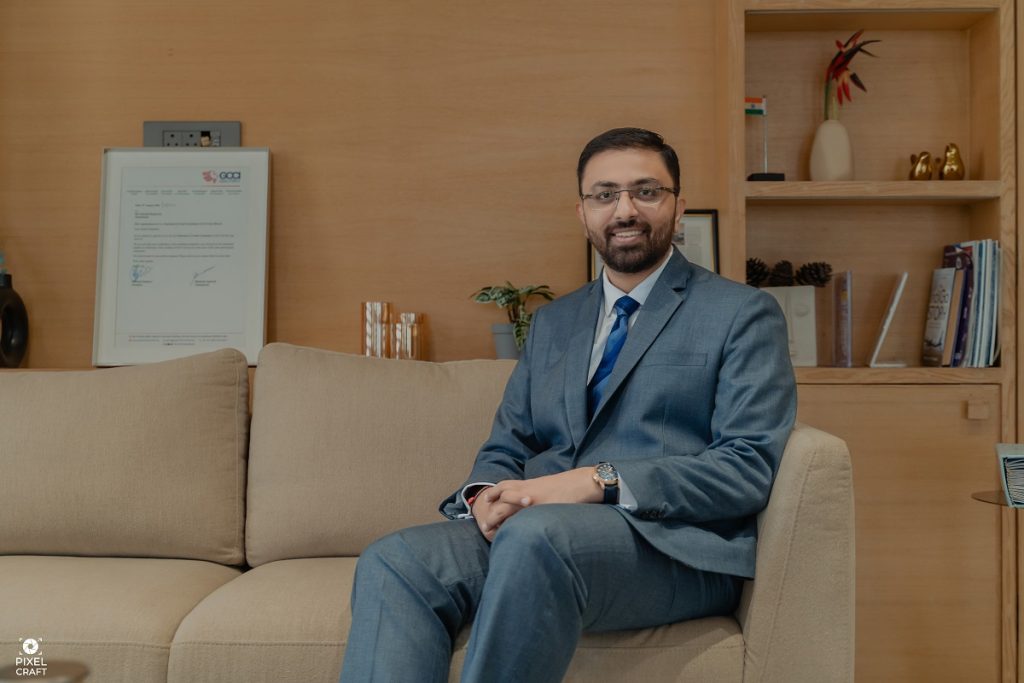This interview has been published by Anshi Mudgal and The SuperLawyer Team
Sir, you’ve built an impressive and diverse practice, spanning corporate, commercial, and dispute resolution matters. What inspired you to establish your own firm, and what has been the most defining challenge in leading it?
The decision to establish my own firm was born out of a deep conviction that law should be practised with independence, integrity, and an unwavering focus on client trust. I always envisioned creating a practice that was not only about providing legal advice but also about becoming a trusted partner in my clients’ journeys, helping them navigate complexities with clarity and confidence. This dream was not easy to pursue—it meant stepping out of my comfort zone, taking risks, and proving myself in a market already dominated by established players and multi-generational professionals.
The most defining challenge was earning credibility in those initial years. With limited resources and no big name to lean on, every client I secured was through persistence, sleepless nights, and consistent delivery of results. It was a struggle marked by countless rejections, long hours, and sacrifices. Yet, these challenges shaped me into the professional I am today—resilient, determined, and deeply committed to excellence.
You dropped out of Chartered Accountancy after giving 4 good years to it before pursuing law. What motivated you to transition into law, and how has your strong commerce background shaped your perspective and strategy in handling complex commercial disputes?
Dropping out of Chartered Accountancy (CA) was a nightmare for my family. After giving 4 long years pursuing CA, one fine day I decided that my calling is into Dispute Resolution and the very fact of appearing in court, preparing arguments and representing the other side of the dispute motivated me to transition into law. Accountancy background gave me a strong foundation in numbers, corporate structures, and financial regulations, but I realised early on that the “why” behind every transaction lay in the law. I wanted to go beyond balance sheets and immerse myself in the world of contracts, disputes, and advocacy, where strategy and persuasion could alter outcomes. The transition was not easy, but it felt natural. I was drawn to the dynamic nature of legal practice, where every case presented a new challenge and an opportunity to make an impact.
My commerce background has been invaluable in my legal career, and pursuing one of the toughest accountancy courses prepared me for the hard work that is required in the legal profession. It allows me to see disputes not just as legal problems but as business realities. When handling complex commercial matters, I can dissect financial nuances while aligning them with legal strategy. This dual perspective gives me an edge in cross-border disputes, shareholder conflicts, and regulatory advisory, where understanding the commercial heartbeat is as crucial as the legal framework.
In the early phase of your career, which experiences were most formative in laying the foundation of your practice, and what advice would you offer to students who are in that phase?
The early phase of my career was defined by struggle, humility, and relentless hard work. I vividly recall handling matters that brought in little financial reward but demanded every ounce of preparation and commitment. Those small victories—whether drafting pleadings late into the night or representing clients who had no one else to stand for them—taught me the real meaning of responsibility and the power of trust people place in their lawyer.
To students, my advice is simple: there is no shortcut to success, and neither is there any alternative to hard work. Never cheat your client and always be honest. Believe in yourself, focus on building your skills and resilience in the early years, rather than chasing titles or monetary gains. The foundations you build now: discipline, diligence, and the ability to think critically, will carry you throughout your career.
This profession rewards patience and persistence far more than instant success.
As an empanelled attorney for multiple foreign consulates and high commissions, you handle roles that require immense precision and discretion. How do you balance these legal nuances, and what challenges have you encountered in representing such esteemed clients?
Being empanelled with a few of the foreign consulates, high commissions, and foreign missions in India itself is an honour and privilege, as very few practising advocates and firms get this opportunity and not all. Representing NRI clients in their legal disputes itself is challenging and a responsibility that goes beyond routine practice. Every communication, every piece of advice, has to be meticulously crafted, knowing that the stakes often extend beyond the client to international relations and reputation.
The greatest challenge has been balancing urgency with accuracy. Foreign clients and NRIs operate on strict timelines, and there is no room for error. I have often worked overnight to deliver outcomes that meet both the legal requirements and the client expectations. These experiences, though demanding, have shaped my ability to remain calm under pressure and deliver with unwavering focus.
Having made significant contributions to dispute resolution and commercial law, what emerging trends do you foresee in cross-border disputes and arbitration involving Indian companies over the next five years?
In the coming years, I foresee arbitration becoming the preferred mode of dispute resolution for Indian companies engaged in cross-border business. The global push for speed and enforceability, coupled with India’s growing recognition as an arbitration hub, will make this trend even stronger. I also anticipate a rise in disputes around technology, data, and e-commerce as businesses continue to expand into digital markets.
Another trend will be the increasing need for companies to become contract-conscious. Too often, businesses treat contracts as formalities rather than safeguards. In cross-border contexts, this can be catastrophic. The future belongs to companies that proactively manage risks, draft robust agreements, and embrace arbitration as a tool to secure their interests.
Your commitment to legal education through judging moot courts and client counselling competitions is commendable. Which skills do you believe law students should prioritise to stay future-ready and uphold the high standards expected in today’s profession?
The profession today demands much more than just knowledge of statutes. The most future-ready lawyers will be those who can think critically, research deeply, and communicate with clarity. In a world where technology is advancing rapidly, adaptability and tech-savviness will be key. Students must be prepared to embrace new fields such as fintech, AI, and compliance law, while still mastering the fundamentals of litigation and arbitration.
Above all, integrity is the cornerstone of this profession. Skills can evolve and be learned, but values remain constant. A lawyer who is trusted for their honesty, dedication and commitment will always stand apart, regardless of the changes the profession undergoes.
Looking back at your career, could you share one of the most challenging cases you’ve handled so far? What were the key complexities involved, and how did you navigate them?
One of the most challenging cases I have handled in my career involved a transnational child custody dispute, where I was appointed by a City Council in the UK to represent the interests of a 14-month-old child who was placed under foster care. The case was uniquely sensitive—not only did it involve intricate questions of international jurisdiction and child welfare, but it also carried an immense emotional weight. My role was to secure an interim order for the safe transit of the child to India, which required balancing legal precision with humanitarian urgency.
Convincing the District Court of First Instance to hear the matter on an urgent basis was no easy task. The odds were against us—procedural hurdles, the complexity of cross-border custody laws, and the natural caution courts exercise in such delicate matters. I vividly recall preparing the case under extraordinary time pressure, knowing that every moment’s delay had real-life consequences for a child’s future. The hearing was conducted on a working day between Diwali and the New Year, a period when courts are generally overburdened, which added another layer of difficulty.
What made this matter truly defining was the responsibility it placed on me—not just as a lawyer, but as a human being. I had to persuade the court that this was not just another legal dispute but an urgent humanitarian concern that required immediate judicial intervention. Ultimately, the case taught me that persistence, empathy, and the ability to rise above procedural roadblocks are what define a lawyer in moments of true challenge. It remains etched in my memory as a reminder of why I chose this profession—to make a tangible difference when it matters the most.
As a registered trademarks attorney, your expertise in intellectual property is widely recognised. How do you see IP laws evolving in India and globally, and what guidance would you give students aspiring to excel in this dynamic field, both in terms of skills and professional values?
Intellectual property is one of the most dynamic areas of law today, both in India and globally. With the rise of digital markets, I foresee stronger frameworks for online infringement, greater protection of trade secrets, and increasing international harmonisation of IP laws. India, too, is rapidly maturing in this space, and the opportunities for young professionals are immense.
For students aspiring to specialise in IP, my advice is to go beyond statutes and cultivate an understanding of industries like technology, pharmaceuticals, and media. IP law is about protecting innovation, and one cannot protect what one does not understand. At the same time, cultivate patience and precision—IP is often a long game where persistence and values matter as much as knowledge. Read landmark judgments on IP laws and get a hold of the principles decided by the courts in such judgments.
Reflecting on your journey from studying law at Gujarat University to becoming a trusted advisor for consulates and leading corporates, you’ve taken on highly varied and demanding roles. How do you balance these professional responsibilities while maintaining your personal life and well-being?
Balancing professional responsibilities with personal life has been one of my greatest struggles. In the early years, work consumed every waking hour, and personal time was a luxury I could not afford. But over time, I realised that sustainability in this profession requires more than just hard work—it requires balance, discipline, and self-care.
Today, I consciously prioritise three things: utmost discipline in managing my time, delegation to empower my team, and detachment to ensure I don’t carry every professional battle home. My family has been my strongest anchor, reminding me of the importance of perspective. At the end of the day, success has meaning only when it is achieved without losing oneself in the process.
Get in touch with Abhijeet Gathraj –




No comment provided.